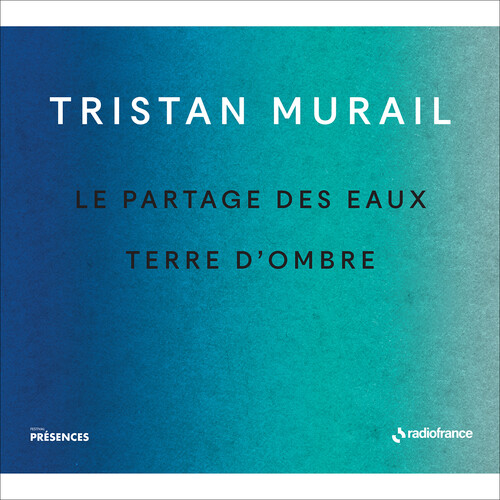Show results for
Deals
- 4K Ultra HD Sale
- Action Sale
- Alternative Rock Sale
- Anime sale
- Award Winners Sale
- Bear Family Sale
- Blu ray Sale
- Blues on Sale
- British Sale
- Classical Music Sale
- Comedy Music Sale
- Comedy Sale
- Country Sale
- Criterion Sale
- Cult Films sale
- Documentaries Sale
- Drama Sale
- Electronic Music sale
- Horror Sci fi Sale
- Kids and Family Sale
- Metal Sale
- Music Video Sale
- Musicals on Sale
- Mystery Sale
- Naxos Label Sale
- Page to Screen Sale
- Paramount Sale
- Rap and Hip Hop Sale
- Reggae Sale
- Rock
- Rock and Pop Sale
- Rock Legends
- Soul Music Sale
- TV Sale
- Vinyl on Sale
- War Films and Westerns on Sale

Le Partages Des Eaux & Terre D'ombre
- Format: CD
- Release Date: 2/16/2024

Le Partages Des Eaux & Terre D'ombre
- Format: CD
- Release Date: 2/16/2024
- Composers: Tristan Murail
- Label: Ocora France
- UPC: 3415820000838
- Item #: 2633173X
- Genre: Classical
- Release Date: 2/16/2024

Product Notes
Since 1991, Radio France has been organising the Presences festival of contemporary music: several hundred new scores have been heard (a third of them world premieres), and the festival is also characterised by a series of portraits of composers from the late 20th century. This CD, along with another volume devoted to Kaija Saariaho, marks a new stage of the Presences festival, which is extending it's activities to include discs. Tonal versus atonal, consonant versus dissonant, neo-classical versus serial, reactionary versus avant-garde, those who mourn a dreamed-of golden age versus those who claim to embody the meaning of history, Landowski versus Boulez, the list goes on and on. These binary and caricatured oppositions have fuelled a debate that has dominated the 20th century, and which is still sometimes in turmoil today. In this context, we are struck by the emergence of spectral music, of which Tristan Murail is one of the initiators and most brilliant exponents. Spectral music proved that history could emerge from this sterile debate, that new territories of sound and harmony existed, that consonances were possible without being part of a backward-looking approach -in short, that composers could move forward, continuing to invent, without having to resort to historically exhausted systems, such as those of tonal music or serial music. The advent of spectral music was a major turning point in the great history of music, and it's scope is such that it's concepts, vocabulary (spectrum, fusion, partials, transients, inharmonics, etc.), writing principles and approach to sound and time have spread throughout the world and over several generations. Few composers today have not been influenced in one way or another by spectral music. From George Benjamin to Kaija Saariaho, from Jonathan Harvey to Fausto Romitelli, via Philippe Hurel, Marc-Andre Dalbavie and Magnus Lindberg, spectral music and it's concepts are everywhere.

